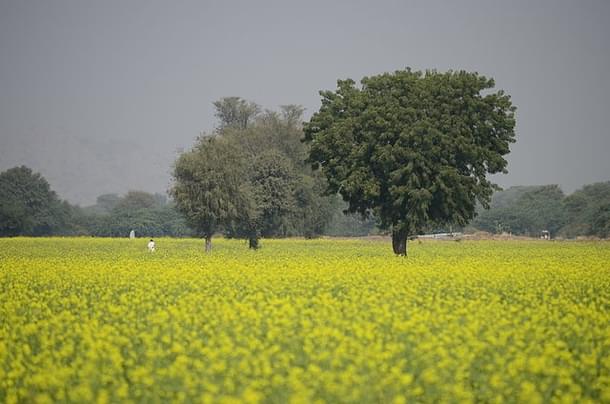Magazine
Rajasthan’s Reforms Story
Arihant Pawariya
Nov 04, 2016, 05:53 PM | Updated 05:53 PM IST
Save & read from anywhere!
Bookmark stories for easy access on any device or the Swarajya app.


Until Prime Minister Narendra Modi moved to 7 Race Course Road, Gujarat used to be touted as a ‘reforms’ laboratory and an ideal model for ‘development’. However, in the last couple of years, Rajasthan has taken over these labels from its southern neighbour.
Embracing the true spirit of competitive federalism, Rajasthan has initiated far-reaching reforms. It has made it easier for firms to fire workers in case they can’t afford them and passed a legislation providing statutory backing to land records. It has freed land acquisitions with respect to special economic zones from ceiling provisions related to agricultural land and moved to downsize debt worth Rs 73,000 crore from its power distribution companies (discoms). It has amended the United Progressive Alliance’s draconian Land Acquisition Act and tweaked the Right to Education Act to enable assessment based on outcomes rather than inputs, and much more.
But perhaps the most consequential of these reforms have taken place in the agriculture sector. Why do these reforms matter more? Consider this: Only 25 per cent of its people live in urban areas, lower than the national average. The livelihood of around two-thirds of the state’s population is, directly or indirectly, dependent on agriculture. And the state ranks among the bottom five in terms of agriculture growth rate.
While the state shares concerns like unpredictable monsoons, falling water table, fluctuation in production, poor soil health, lack of credit, lack of adequate technology and below-average irrigation infrastructure, with the rest of the country, it has its share of unique problems. A large part of the state is a desert with a semi-arid climate. In many parts, farmers grow only one crop throughout the year. But since Vasundhara Raje has taken charge in 2013, the state government has introduced significant changes to address these and other challenges.
The Raje government, for instance, took advantage of Modi’s e-NAM initiative that was launched in April with an aim to facilitate the online trading of farm produce. At the time, only one mandi in the state was made part of the portal. But thanks to the amendments made by the state to its Agricultural Produce and Marketing Committee (APMC) Act, the number of mandis has now touched 11.
The changes in the APMC Act include permitting contract farming for fruits and vegetables and medicine or aromatic plants. So now a store selling fruits and vegetables in a city can make a deal with local farmers in nearby villages to procure their produce directly.
To foster greater competition, private sub e-markets have been allowed. Agro-processing enterprises can now engage in the direct purchase of agriculture and horticulture products produced in the state. They will be exempt from paying the mandi fee. The market fee on fruits and vegetables has also been abolished.
The government probably realised that merely connecting more mandis to the e-NAM portal will not be enough. What if a farmer from the state finds that his produce is fetching a greater sum in, say, a mandi in Gujarat or Haryana and wants to sell it there? The transportation cost itself would negate the gains that he otherwise stands to make. To address this limitation, the government decided to provide a transport subsidy on fruits and vegetables beyond a 300-km distance.
In 2014, the state legislature made it easier for farmers to lease a part or whole of their land for renewable energy projects. Rajasthan is already the second-largest power producer in the country. This reform will not only tip the balance in its favour but also ensure that farmers with not-so-fertile lands keep receiving a fixed income. It will also facilitate the construction of a solar park of 10,000 MW, which the government has decided to build in collaboration with the Adani Group.
In April, Rajasthan became the first state in the country to provide statutory backing to land records by passing the Urban Land (Certification of Titles) Bill. Clear property titles will bring down land disputes, unlock “dead capital” by facilitating easier exchange of ownership, make it easier for small and marginal farmers to obtain credit and enable the consolidation of marginal land holdings, which is a bane for Indian agriculture.
Water is a prized commodity for a dry state like Rajasthan. Hence, water conservation and optimum utilisation of available resources assume immense significance. Last year, the government launched Mukhyamantri Jal Swavalamban Abhiyaan to revive ancient water bodies, improve water conservation efforts on the ground and implement more water storage initiatives. Officials have been told to upload the photos of water storage structures and geotag them. This ensures transparency. Also, the progress is tracked online constantly.
Apart from this, the state’s Water Resource Management Authority is looking at ways to interlink various river basins. However, one is not sure of achieving success in this area, given the lacklustre performance of governments in interlinking rivers. In any case, it may take years before any tangible change is achieved.
The Raje government is also undertaking crucial subsidy reforms. The current Public Distribution System establishes a dual price regime which distorts the market. It leads to black marketeering, adulteration, the divergence of items and what not. Every government is aware of the consequences, but as Milton Friedman would say, nothing is so permanent as a temporary government programme.
Rajasthan is rationalising the system. It is giving beneficiaries a choice to opt for cash subsidy transfers directly into their bank accounts. It is also turning ration shops into fair price shops that will act as “malls for villages”. Apart from subsidised items, 600 other products of daily use will be made available at these outlets. This will achieve two things: people won’t have to go to towns or cities to buy essential items and those operating the ration shops will find more days of employment, as opposed to the earlier system where the shops would be open only for a few days in a month.
While all these steps are welcome, the Raje government’s reluctance to embrace GM mustard is bothersome. It should learn from the Gujarat experience, where during his tenure as chief minister, Modi defied the directives of the country’s technology regulator, GEAC. The regulator had wanted the state government to destroy the crops of farmers and tribals who had illegally obtained seeds and grown Bt cotton and GM maize respectively.
Embracing high-yield GM mustard is crucial for Rajasthan, which happens to be its leading producer in the country. It will also help India trim the import bill for edible oil, which is increasing every year. Edible oil imports have risen from 44 lakh tonnes to about 140 lakh tonnes (worth 66,000 crore) in the last decade.
The Raje government has been bold in ushering in wide-ranging reforms that can transform the state of Rajasthan.
But can good economics translate into good politics?
The jury is still out on that.
Arihant Pawariya is Senior Editor, Swarajya.





